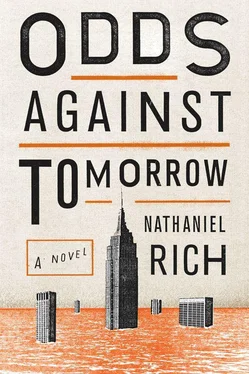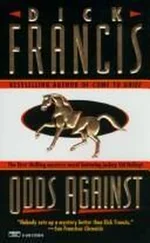Two dozen students rose loudly to their feet, gathering their laptops and bags, pushing their way out of the lecture hall. There was a tussle in the row ahead of us. A female student, her face heavily flushed, had become entangled with the boy sitting beside her. In her frustration she shoved him.
“My brother lives in Seattle!” she shrieked. She ran up the aisle sobbing.
Olesha could no longer ignore the tumult. Red with rage, he pounded the lectern twice. “For anyone who is serious about this course, I will conduct the rest of the lecture across the hall.” He marched out. Nobody followed.
Five seconds later the portrait of Pushkin flickered off the giant screen. Someone was manipulating the remote control. The lights dimmed, and a live television feed came on. The reporter’s voice was loud and hoarse in the speakers. We saw incoherent flashes of flame, glass, metal, sea. No one spoke. We were trying to understand what we were watching. Beside me Mitchell was shaking. He shielded his eyes like a child at a horror movie.
I hardly need to rehearse for you the emotion of that day, the confusion and terror, but certain images I will never forget. A naked child, covered in ash, walking dazed through a mountain of rubble. A helicopter, its blades spinning frantically, sinking slowly into the sound. A convertible impaled on a stoplight. A dozen bodies running madly in every direction, silhouetted against a swelling wall of flame. The news reporter, no doubt in shock himself, stopped talking.
The images cohered into a narrative and we began to make sense of it. The silence in the lecture hall was broken by three screams in rapid succession. These were followed by the muted whimper of hundreds of people weeping. Cell phones buzzed. But most of us stayed in our seats, transfixed by what we were seeing. Everything happened very slowly. The network, having lost several of its street feeds, held for several minutes on an overhead shot of the Seattle harbor taken from the vantage of a looming blimp. Great billows of smoke obscured downtown, so the extent of damage was unclear. For all we knew, there might have been, beneath the blooming clouds of ash, an abyss as deep as the center of the earth. “We want to hold our breath,” said the news anchor, stuttering. “Let’s not jump to any conclusions.” A correspondent called from a parking lot in North Seattle. “There is a complete cessation of regular life,” she said. “Everyone is standing outside, staring at the ground. Waiting. Staring at the ground.” The anchor thanked her. “We want,” he said, “to hold our breath.”
It seems horrible now, but I remember laughing. It started in my stomach, a light, ticklish sensation like a bubble rising, rising in my chest until it burst out in a wild guffaw. Nobody noticed — there were a lot of odd, uncontrolled noises in that lecture hall. The thought that made me laugh, though it is not at all funny in retrospect, was this: I felt that I had entered Mitchell Zukor’s head. Sitting in that hall as the smoke plumed on the screen, I felt as if I were eavesdropping on one of Mitchell’s nightmares. I felt very close to him then.
But when I glanced at Mitchell I saw that he had turned away. Something else had claimed his attention. I followed his gaze to the other end of our row, where an auburn-haired girl had collapsed awkwardly in her seat. Her head was twisted to one side, and her arms dangled crookedly beneath her. She was alone. In the commotion no one else seemed to have noticed her.
Mitchell shot past me, racing down the row, knocking his kneecaps against the chairs as he went. I followed, glancing back and forth between the images of the atrocity and the fainted girl. The juxtaposition was unsettling. It was as if somehow the monster on the screen had reached its talons into Cobb Hall and snatched one of us.
When I caught up to Mitchell, he was frozen, hunched over the girl.
“She needs fresh air,” I said.
At the sound of my voice he spun around. His eyes were large and white.
“She didn’t faint,” said Mitchell.
“How do you know?”
He pulled himself to one side so I could see the girl’s face. I didn’t recognize her.
“It’s Elsa ,” said Mitchell. “It’s Elsa Bruner!”
* * *
Mitchell had first seen Elsa Bruner on a visit the previous October to the Student Health Service. Mitchell was on good terms with the people at SHS — a regular customer. They knew all his specials before he sat down. What would it be this week? A red, scaly patch of unknown provenance? Neck lump? Vague pain about the groin? The nurses welcomed him with patient smiles and made him wait until they had treated everyone with unimagined health concerns.
That particular October morning the doctor had called Elsa Bruner’s name and a pallid, slender, but seemingly healthful girl stood up. She met with the doctor for ten minutes and, after signing a form at the front desk, went on her way. She was not especially attractive or even distinct — a small nose, reddish brown hair hanging loosely to her shoulders, soft eyes spaced slightly too far apart, a delicate chin — and Mitchell would have immediately forgotten her had he not seen her medical form when he checked out. (Mitchell, the doctor had cheerily informed him, was merely exhausted and overstressed; he did not have Crohn’s disease.) Elsa’s medical file, thickly stuffed, was still lying on the counter, and Mitchell couldn’t help but notice, printed in large caps on the top of the front page, the word “BRUGADA.” Other than several cardiologists in the medical school, Mitchell was undoubtedly the only person on campus who understood the meaning of this word.
“It’s a heart disorder,” he explained in the dining hall that night. “It can strike you dead at any time. But otherwise you’re completely healthy.”
“That’s a thing you made up.”
“A girl at U. of C. has it. A second-year. Her name is Elsa Bruner. She was at SHS this morning.”
“Her heart stopped?”
“No. She was probably there for a routine EKG.”
“Is she hot.”
“Don’t you get it? She can drop dead at any time.”
We gave prudent nods. “So she’s desperate.”
Mitchell ignored us. “Can you imagine?” he said. One of his hands began absently to pull at his hair. “She’s a walking worst-case scenario. How does she get out of bed?”
We murmured halfhearted words of concern, but it was too late. We’d lost him. He stood up, shaking his head, and walked out of the dining hall, into the cold night.
Mitchell must have thought about Elsa Bruner often, but I don’t recall that he mentioned her again, and I know he never talked to her until the day of the earthquake. I also know that he never returned to the Student Health Service.
* * *
The lecture hall was nearly empty when the two paramedics arrived. Elsa was sitting up in her chair, her hand on her heart. Mitchell’s hand was on his heart too. He was having pains.
“How do you feel?”
She didn’t appear to hear him. There was a quavering, absent curl to her lips. “It happened again.”
She closed her eyes.
“Elsa?”
“I’m only resting,” she said, blinking. “It’s over now.”
She tried to wave the paramedics away, but they ignored her and slapped a blood pressure cuff around her arm. They scanned her student ID into a black machine that resembled a credit card reader. A buzzer sounded and a red light flashed. This seemed to alarm them.
“Ms. Bruner? We need to take you to the hospital. Are you able to walk?”
She nodded and rose stiffly from her seat.
“Do I know you?” she asked Mitchell.
He shook his head and introduced himself.
“I’m sorry you’re … sick.”
Читать дальше












